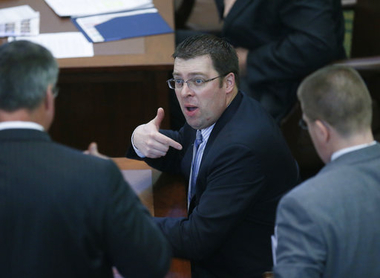Oklahoma to send crime victims' 'bill of rights' to ballot

OKLAHOMA CITY (AP) — Oklahoma voters will decide whether to enshrine a so-called crime victims' bill of rights into the state constitution, despite concerns from defense attorneys and some prosecutors that the proposal could lead to costly unintended consequences.
With little discussion and no debate, the House voted 88-0 on Tuesday to send "Marsy's Law " to the ballot in November 2018.
If approved by voters, the measure would require crime victims be notified and heard in most criminal proceedings, a right to protection and "full and timely" restitution, the right to confer with prosecutors, and would prohibit "unreasonable delay" of criminal cases, among other things.
"What we're asking is to elevate the victims' rights to the same level as the defendants' rights," said Rep. Scott Biggs, a Chickasha Republican and a former prosecutor who authored the bill. "Not more, not less, but simply put the victims' rights at the same level as the defendants' rights."
The push to enact the constitutional amendment in Oklahoma, which included the hiring of nine lobbyists and two public relations companies, is being bankrolled by Henry Nicholas, a retired California businessman who made his fortune as the co-founder of Broadcom Corporation. Nicholas became a victims' rights advocate after his sister, Marsy, was shot and killed by her ex-boyfriend in 1983 and campaigned to have Marsy's Law approved by California voters in 2008. Similar proposals have been approved in Illinois, Montana, North Dakota and South Dakota, and efforts are underway to have the proposal placed on ballots in nine other states, including Oklahoma.
But those involved in the criminal justice system say the proposal is entirely unnecessary and could actually divert resources from both prosecutors and law enforcement.
"The first thing one would have to do is establish the clear meaning of these provisions, and then people would have to be trained in terms of how to abide by these new requirements," said Oklahoma City University law professor Arthur LeFrancois, who noted the Oklahoma Constitution already spells out rights for crime victims, "so there would certainly be additional obligations created for both law enforcement and prosecutors."
In North Dakota, where a similar measure was approved by more than 60 percent of voters in November, the proposal faced opposition from prosecutors, defense attorneys, law enforcement and victims' rights groups.
"There will be constitutional clashes between well-established law and the provisions of this poorly conceived measure," Grand Forks County, North Dakota, state's attorney David Jones wrote in an editorial opposing the measure . "This will result in justice delayed as well as greater cost to the legal system."
Eric Schweitzer, a criminal defense attorney in California, described the measure's effect on that state as an "unmitigated disaster" that places too much emphasis on the will and desire of the victims of crime.
"No matter where you prosecute, it's the role of the prosecutor to seek justice, not vengeance," Schweitzer said. "Victims do not represent the people of the state. They represent their own interests.
"The question the Oklahoma voters have to ask is whether it will be a court of justice or a court of vengeance."
_
Copyright 2017 The Gayly - 4/4/2017 @ 5:59 p.m. CDT





